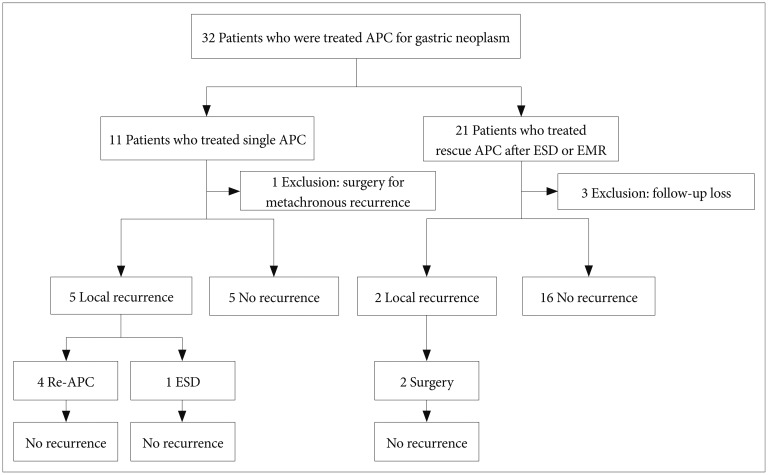Clin Endosc.
2015 Mar;48(2):147-151. 10.5946/ce.2015.48.2.147.
Clinical Outcomes of Argon Plasma Coagulation Therapy for Early Gastric Neoplasms
- Affiliations
-
- 1Department of Internal Medicine, Kyungpook National University School of Medicine, Daegu, Korea. sw-jeon@daum.net
- KMID: 1801206
- DOI: http://doi.org/10.5946/ce.2015.48.2.147
Abstract
- BACKGROUND/AIMS
Argon plasma coagulation (APC) has some merits in the treatment of gastric neoplasms including a shorter operative time and fewer complications compared with endoscopic mucosal resection or endoscopic submucosal dissection. However, there are few reports on the outcomes of gastric neoplasms treated using APC. The aim of this study was to evaluate APC in the treatment of early gastric neoplasms in terms of clinical efficacy, safety, and local recurrence.
METHODS
We enrolled 28 patients who received APC therapy at the Kyungpook National University Hospital between May 2007 and April 2013. Clinical outcomes were analyzed.
RESULTS
The median follow-up period was 24.8 months (range, 2 to 78). Among the 28 lesions treated using the APC procedure, tumor recurrence was encountered in seven lesions (25.0%). Recurrence was found in 50% (5/10) of single APC cases and 11% (2/18) of rescue APC cases. The mean time to recurrence was 16.1 months (range, 2 to 78). There were no serious APC-related complications such as perforation, bleeding, or infection.
CONCLUSIONS
APC therapy can be a useful treatment with a favorable safety profile for patients with early gastric neoplasms. However, further studies are necessary to determine the long-term prognosis of patients undergoing this treatment.
MeSH Terms
Figure
Reference
-
1. Gotoda T, Yamamoto H, Soetikno RM. Endoscopic submucosal dissection of early gastric cancer. J Gastroenterol. 2006; 41:929–942. PMID: 17096062.
Article2. Ono H, Kondo H, Gotoda T, et al. Endoscopic mucosal resection for treatment of early gastric cancer. Gut. 2001; 48:225–229. PMID: 11156645.
Article3. Ahn JY, Jung HY, Choi KD, et al. Endoscopic and oncologic outcomes after endoscopic resection for early gastric cancer: 1370 cases of absolute and extended indications. Gastrointest Endosc. 2011; 74:485–493. PMID: 21741645.
Article4. Grund KE, Storek D, Farin G. Endoscopic argon plasma coagulation (APC) first clinical experiences in flexible endoscopy. Endosc Surg Allied Technol. 1994; 2:42–46. PMID: 8081915.5. Wahab PJ, Mulder CJ, den Hartog G, Thies JE. Argon plasma coagulation in flexible gastrointestinal endoscopy: pilot experiences. Endoscopy. 1997; 29:176–181. PMID: 9201466.
Article6. Chau CH, Siu WT, Law BK, et al. Randomized controlled trial comparing epinephrine injection plus heat probe coagulation versus epinephrine injection plus argon plasma coagulation for bleeding peptic ulcers. Gastrointest Endosc. 2003; 57:455–461. PMID: 12665753.
Article7. Sebastian S, McLoughlin R, Qasim A, O'Morain CA, Buckley MJ. Endoscopic argon plasma coagulation for the treatment of gastric antral vascular ectasia (watermelon stomach): long-term results. Dig Liver Dis. 2004; 36:212–217. PMID: 15046192.
Article8. Sagawa T, Takayama T, Oku T, et al. Argon plasma coagulation for successful treatment of early gastric cancer with intramucosal invasion. Gut. 2003; 52:334–339. PMID: 12584212.
Article9. Tomita T, Arai E, Kohno T, et al. Outcomes of treatment of argon plasma coagulation therapy in elderly or high-risk patients with early gastric cancer: a comparison of outcomes among experienced and nonexperienced endoscopists. J Clin Gastroenterol. 2011; 45:e54–e59. PMID: 20838235.10. Ahn JY, Choi KD, Na HK, et al. Clinical outcomes of argon plasma coagulation for the treatment of gastric neoplasm. Surg Endosc. 2013; 27:3146–3152. PMID: 23443483.
Article11. Japanese Gastric Cancer Association. Japanese classification of gastric carcinoma: 2nd English edition. Gastric Cancer. 1998; 1:10–24. PMID: 11957040.12. Murakami M, Nishino K, Inoue A, et al. Argon plasma coagulation for the treatment of early gastric cancer. Hepatogastroenterology. 2004; 51:1658–1661. PMID: 15532798.13. Kitamura T, Tanabe S, Koizumi W, Mitomi H, Saigenji K. Argon plasma coagulation for early gastric cancer: technique and outcome. Gastrointest Endosc. 2006; 63:48–54. PMID: 16377315.
Article
- Full Text Links
- Actions
-
Cited
- CITED
-
- Close
- Share
- Similar articles
-
- A case of gastric antral vascular ectasia treated with argon plasma coagulation
- Two Cases of Asymptomatic Pneumoperitoneum after Argon Plasma Coagulation Treatment
- A Case of Huge Gastric Angiodysplasia Treated with Argon Plasma Coagulation
- A Case of Argon Plasma Coagulation Therapy for Hemorrhagic Radiation-induced Gastritis
- Treatment Strategy after Incomplete Endoscopic Resection of Early Gastric Cancer


